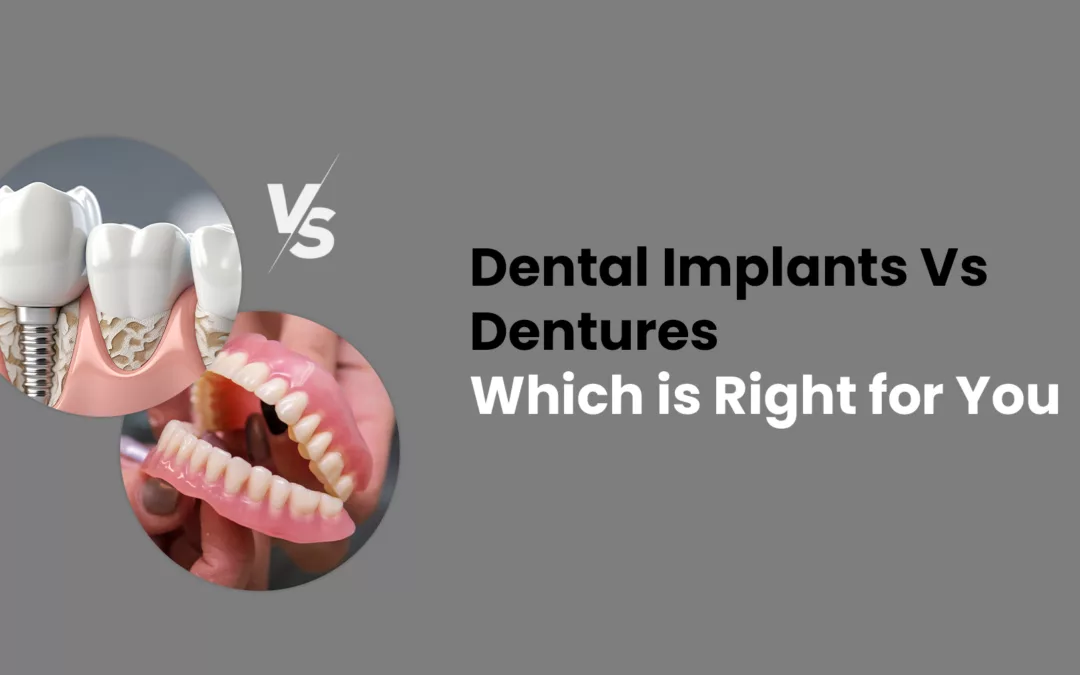Choosing between dental implants and dentures can be a significant decision when addressing tooth loss. Both options have their unique benefits and potential drawbacks, making it essential to understand which solution is best suited for your individual needs. In this blog, we will explore the differences between dental implants and dentures, helping you make an informed choice.
What are Dental Implants?
Dental implants treatment are artificial tooth roots made of titanium that are surgically placed into the jawbone. Once integrated with the bone, they provide a stable foundation for attaching artificial teeth, such as crowns or bridges. Dental implants mimic the look, feel, and function of natural teeth, making them a popular choice for tooth replacement.
What are Dentures?
Dentures are removable prosthetic devices designed to replace missing teeth. They come in two main types: complete dentures, which replace all the teeth in the upper or lower jaw, and partial dentures, which replace a few missing teeth. Dentures are typically made from acrylic resin and, in some cases, metal components to ensure a proper fit and function.
Advantages of Dental Implants
- Longevity and Durability: Dental implants are known for their longevity. With proper care, they can last a lifetime, making them a cost-effective solution in the long run.
- Natural Appearance and Comfort: Implants look and feel like natural teeth, offering superior comfort and aesthetics. They do not slip or move, enhancing the wearer’s confidence while speaking and eating.
- Bone Health Preservation: Implants stimulate the jawbone, preventing bone loss that often occurs after tooth loss. This helps maintain the facial structure and prevents the sunken appearance associated with missing teeth.
- No Impact on Adjacent Teeth: Unlike dental bridges, which rely on adjacent teeth for support, implants do not affect surrounding teeth. This helps preserve the integrity of natural teeth.
Disadvantages of Dental Implants
- Cost: Dental implants can be expensive, especially if multiple implants are required. The initial investment is higher compared to dentures.
- Surgical Procedure: The process of getting dental implants involves surgery, which carries risks such as infection and complications. Additionally, the healing process can take several months.
- Not Suitable for Everyone: Patients with insufficient jawbone density or certain health conditions may not be ideal candidates for implants. Bone grafting might be required, adding to the complexity and cost.
Advantages of Dentures
- Affordability: Dentures are generally more affordable than dental implants, making them a viable option for many patients.
- Non-Invasive: Getting dentures does not require surgery, making the process less invasive and more straightforward.
- Immediate Results: Dentures can often be made and fitted more quickly than implants, providing a faster solution to tooth loss.
- Customizable: Dentures can be easily adjusted or remade to fit changes in the mouth, ensuring continued comfort and function.
Disadvantages of Dentures
- Comfort and Fit: Dentures can sometimes be uncomfortable and may require adjustments over time. They can also slip or move while speaking or eating, causing embarrassment and inconvenience.
- Bone Loss: Dentures do not stimulate the jawbone, which can lead to bone loss over time. This may result in changes to facial structure and the need for frequent denture adjustments.
- Maintenance: Dentures require regular maintenance, including cleaning and proper storage. They need to be removed and cleaned daily to prevent infections and maintain oral hygiene.
- Lifespan: Dentures typically need to be replaced every 5-8 years due to wear and changes in the mouth, making them a less durable option compared to implants.
Which is Perfect – Dental Implants Versus Dentures?
The choice between dental implants and dentures ultimately depends on several factors, including your budget, overall health, and personal preferences. Here are some considerations to help you decide:
- Budget: If cost is a significant concern, dentures may be the more affordable option. However, if you can afford the initial investment, dental implants may provide better long-term value.
- Oral Health: Consider the health of your jawbone and any underlying conditions that might affect healing. Dental implants require a healthy jawbone for support, while dentures do not.
- Lifestyle: If you prefer a permanent solution that mimics natural teeth, dental implants are likely the better choice. If you prefer a non-invasive, removable option, dentures might be more suitable.
- Longevity: If you seek a long-term solution with minimal maintenance, dental implants are ideal. However, if you are comfortable with periodic adjustments and replacements, dentures could work well for you.
Conclusion
Both dental implants and dentures offer viable solutions for replacing missing teeth. By understanding their advantages and disadvantages, you can make an informed decision that best suits your needs. Consult with your dentist to discuss your options and determine the best course of action for restoring your smile and oral health.

